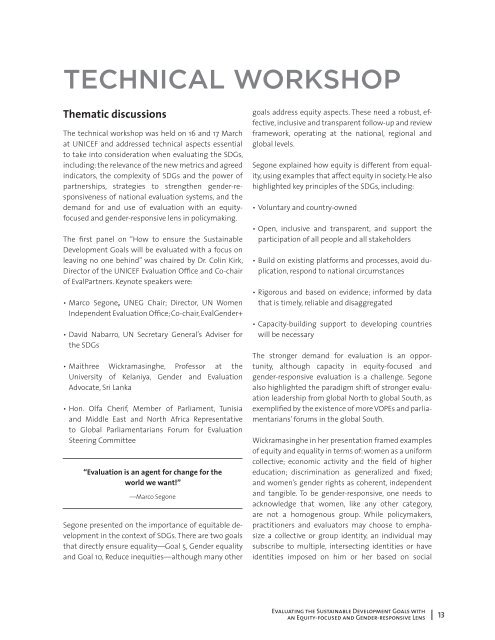NO ONE LEFT BEHIND
NY-Events-Report_WEB
NY-Events-Report_WEB
You also want an ePaper? Increase the reach of your titles
YUMPU automatically turns print PDFs into web optimized ePapers that Google loves.
TECHNICAL WORKSHOP<br />
Thematic discussions<br />
The technical workshop was held on 16 and 17 March<br />
at UNICEF and addressed technical aspects essential<br />
to take into consideration when evaluating the SDGs,<br />
including: the relevance of the new metrics and agreed<br />
indicators, the complexity of SDGs and the power of<br />
partnerships, strategies to strengthen gender-responsiveness<br />
of national evaluation systems, and the<br />
demand for and use of evaluation with an equityfocused<br />
and gender-responsive lens in policymaking.<br />
The first panel on “How to ensure the Sustainable<br />
Development Goals will be evaluated with a focus on<br />
leaving no one behind” was chaired by Dr. Colin Kirk,<br />
Director of the UNICEF Evaluation Office and Co-chair<br />
of EvalPartners. Keynote speakers were:<br />
••<br />
Marco Segone, UNEG Chair; Director, UN Women<br />
Independent Evaluation Office; Co-chair, EvalGender+<br />
••<br />
David Nabarro, UN Secretary General’s Adviser for<br />
the SDGs<br />
••<br />
Maithree Wickramasinghe, Professor at the<br />
University of Kelaniya, Gender and Evaluation<br />
Advocate, Sri Lanka<br />
••<br />
Hon. Olfa Cherif, Member of Parliament, Tunisia<br />
and Middle East and North Africa Representative<br />
to Global Parliamentarians Forum for Evaluation<br />
Steering Committee<br />
“Evaluation is an agent for change for the<br />
world we want!”<br />
—Marco Segone<br />
Segone presented on the importance of equitable development<br />
in the context of SDGs. There are two goals<br />
that directly ensure equality—Goal 5, Gender equality<br />
and Goal 10, Reduce inequities—although many other<br />
goals address equity aspects. These need a robust, effective,<br />
inclusive and transparent follow-up and review<br />
framework, operating at the national, regional and<br />
global levels.<br />
Segone explained how equity is different from equality,<br />
using examples that affect equity in society. He also<br />
highlighted key principles of the SDGs, including:<br />
••<br />
Voluntary and country-owned<br />
••<br />
Open, inclusive and transparent, and support the<br />
participation of all people and all stakeholders<br />
••<br />
Build on existing platforms and processes, avoid duplication,<br />
respond to national circumstances<br />
••<br />
Rigorous and based on evidence; informed by data<br />
that is timely, reliable and disaggregated<br />
••<br />
Capacity-building support to developing countries<br />
will be necessary<br />
The stronger demand for evaluation is an opportunity,<br />
although capacity in equity-focused and<br />
gender-responsive evaluation is a challenge. Segone<br />
also highlighted the paradigm shift of stronger evaluation<br />
leadership from global North to global South, as<br />
exemplified by the existence of more VOPEs and parliamentarians’<br />
forums in the global South.<br />
Wickramasinghe in her presentation framed examples<br />
of equity and equality in terms of: women as a uniform<br />
collective; economic activity and the field of higher<br />
education; discrimination as generalized and fixed;<br />
and women’s gender rights as coherent, independent<br />
and tangible. To be gender-responsive, one needs to<br />
acknowledge that women, like any other category,<br />
are not a homogenous group. While policymakers,<br />
practitioners and evaluators may choose to emphasize<br />
a collective or group identity, an individual may<br />
subscribe to multiple, intersecting identities or have<br />
identities imposed on him or her based on social<br />
Evaluating the Sustainable Development Goals with<br />
an Equity-focused and Gender-responsive Lens 13


